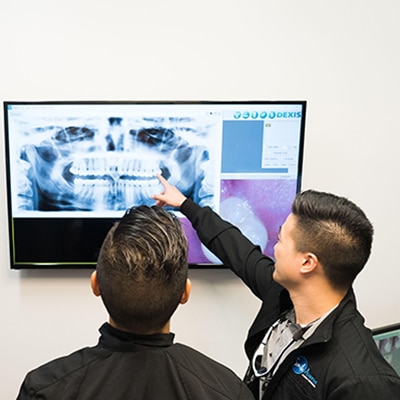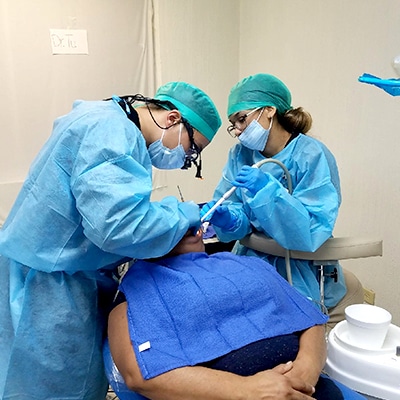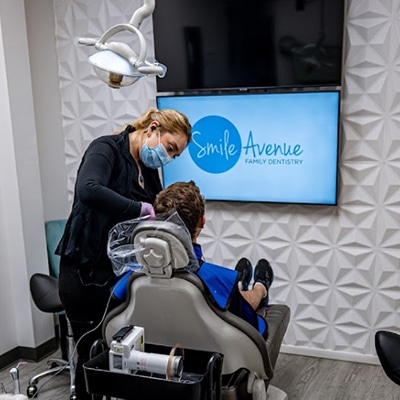
Yellow teeth despite whitening treatments are a common issue that many people face. Exploring the reasons behind this problem can provide insights into achieving the desired bright smile. In this blog post, we will investigate the common causes of enduring tooth discoloration following whitening and consider effective solutions. While we typically link yellow teeth to braces or inadequate hygiene, teeth whitening might also contribute to this issue. Various factors can lead to teeth appearing more yellow after whitening, with genetics and staining being the most prevalent.
Genetics
The natural yellowing of teeth in certain individuals can pose a challenge to the effectiveness of teeth whitening procedures. The thickness of the enamel of your teeth is influenced by genetics. If your enamel is thin, the yellow color of the underlying dentin layer will normally show through more clearly.
Although some teeth-whitening products are more effective than others, it’s important to remember that this is a typical occurrence and that your teeth, even if they appear yellow, are still perfectly healthy.
Staining
If your recurring complaint is, “My teeth are still yellow after whitening,” it’s probably because you’re a heavy tea and coffee drinker.
Because of the tannins in these drinks—a sort of polyphenol or ingredient found in plant-based foods that dissolve in water—the yellow discoloration is more difficult to remove than other stains. With time, these tannins cling to your teeth’s enamel and create yellowish stains.
Similar to this, frequent use of tobacco products or cigarette smoking might cause your teeth to remain yellow even after whitening procedures. A yellow coating on your tongue could also be noticed.
Damaged Enamel
If your teeth continue to turn yellow despite having them whitened, enamel degradation could be the culprit. Your teeth dentin is yellow, and when the enamel is worn down, the dentin may become visible and discolored.
If your teeth are harmed in this way, whitening them further could make the problem worse, therefore you should see a dentist if you suspect this. But if genetics or stains alone are the problem, you can benefit from another round of whitening.
How To Prevent Yellow Teeth After Whitening
To maintain the brightness of your smile over time, whether you’ve recently undergone teeth whitening or are planning to do so soon, consider implementing a few key practices.
These tips can be valuable, but if you encounter persistent issues or significant sensitivity, it’s advisable to consult with your dentist. For personalized guidance and professional care, reach out to Dr. Patrick Vuong, a trusted cosmetic dentist in Katy.
Avoid Staining Foods And Drinks Such As Coffee Or Wine
Over time, dark-colored soft drinks, alcohol, and coffee can all discolor your teeth. Steer clear of these meals and beverages to help prevent stains.
If you do want to indulge in these, be sure to wash your teeth regularly to avoid dental buildup. You might also try using toothpaste made especially for removing stains or sipping through a straw.
Quit Smoking
If you smoke, some of the stains on your teeth are likely from the smoke. Giving up smoking can correct some of the yellowing you’ve already observed and help avoid additional deterioration.
The tar and nicotine in cigarettes, which are both difficult to get rid of with frequent cleaning, are what give teeth a chronic yellowing.
Smoke tar can leave teeth with a deeper stain, and nicotine and oxygen together can cause the enamel to yellow because of microscopic pores that let the substances through.
Maintain Healthy Dental Hygiene Habits
Maintaining white teeth requires a routine of brushing twice daily and flossing once a day. The accumulation of plaque on your teeth over time can lead to a yellowish appearance. It’s crucial to note that plaque can calcify within 24 hours, necessitating removal by a dental hygienist. The tools you choose for dental care play a significant role.
Utilizing a soft-bristled toothbrush and fluoride toothpaste is ideal for plaque removal, ensuring the enamel remains undamaged. In addition to daily oral care, regular dental checkups are vital for the overall whiteness and health of your teeth. During these checkups, your dentist can assess if a professional cleaning or whitening treatment is necessary.
Drink Plenty Of Water
Maintaining the health of your teeth involves the beneficial role of water in rinsing away food particles that contribute to staining. Additionally, water helps keep your mouth adequately hydrated, a key factor in cleanliness and decay prevention. Dehydration can lead to thicker saliva, diminishing its effectiveness in neutralizing and eliminating bacteria.
For individuals consuming coffee or tea throughout the day, it is advisable to rinse the mouth with water afterward to minimize staining on the teeth. Ensuring sufficient water intake not only contributes to oral health but also plays a vital role in overall well-being, making it an essential aspect that should not be neglected.
Keep Up With Regular Dental Cleanings
If you notice yellowing in your teeth, seeking a professional cleaning is essential. A dental hygienist possesses the expertise to eliminate the accumulated tartar and plaque, preserving the whiteness and health of your teeth over time.
Regular cleanings not only maintain the current white appearance but also act as a preventive measure against future discoloration. Additionally, the hygienist can identify underlying issues contributing to yellowing and offer recommendations for necessary treatments or lifestyle adjustments to ensure the longevity of your white teeth.
Why Won’t My Yellow Teeth Whiten?
At-home teeth whitening techniques like whitening strips and toothpaste can effectively eliminate surface-level stains on your teeth. However, for the removal of deeply embedded discoloration or colored dentin, the intervention of a dentist through professional teeth whitening services becomes essential. In such cases, relying solely on natural teeth whitening methods may not produce satisfactory results.
How Long Does It Take To Whiten Yellow Teeth?
The dentist might suggest the application of whitening toothpaste, advocating a routine of brushing twice a day for a duration of two to six weeks. Results from a certified whitening mouthwash may become noticeable after up to three months. Whitening strips emerge as the most effective at-home treatment, offering lasting results for up to six months.
In a dental setting, a professional teeth whitening procedure typically takes between 30 minutes to an hour and a half. The achievement of desired teeth whiteness may require one or more appointments, depending on the extent of staining and individual preferences.
Can Some Teeth Not Be Whitened?
If you have veneers, dentures, dental implants, tooth-colored composite fillings, or have undergone cosmetic bonding, teeth whitening treatments may not be appropriate for you. This is because certain dental restorations may not lighten, resulting in a potentially uneven and patchy appearance.
Can Badly Yellow Teeth Be Whitened?
If you’re concerned about your teeth displaying a yellowish tint and desire to regain their original white shade, you might be curious about the possibility of whitening yellow teeth. Fortunately, there are multiple available options. Consult with your dentist to determine the most suitable approach based on the extent of discoloration and the specific results you are seeking.
Is It Too Late To Fix Yellow Teeth?
Enhancing the whiteness of your teeth proves to be a successful method for boosting your confidence and overall happiness, regardless of your age. With approval from your dentist, it’s possible to enhance your smile at any stage of life.
For a more impactful whitening effect, advanced professional-grade treatments are available. These treatments penetrate deep into the enamel layers, effectively eliminating stubborn stains that may have accumulated over the years, such as those caused by prolonged consumption of coffee or tea.
Will My Teeth Ever Be White Again?
At-home whitening products effectively eliminate minor surface stains on teeth. However, for more pronounced discoloration, it is advisable to seek advice from a dentist for more potent treatments that can effectively lighten and enhance your smile.
It’s important to note that addressing certain internal stains may prove challenging, necessitating professional treatments, which could potentially involve multiple sessions.
Is Teeth Yellowing Permanent?
The permanence of yellow teeth is not inevitable. There is the possibility of whitening them while also upholding appropriate oral hygiene practices to preserve a healthy appearance. The duration of time during which the teeth have been discolored also plays a role in determining the ease with which they can be restored to their natural color.
How Do You Deeply Whiten Your Teeth?
A typical at-home teeth whitening kit includes a bleaching agent known as carbamide peroxide, capable of eliminating both deep and surface stains, and potentially altering the natural color of your teeth.
For those whose once bright and white smile has been diminished by coffee stains, these kits offer an efficient means of restoration. Some kits even feature a peroxide-containing gel that is applied to the enamel of the teeth through brushing.
These at-home whitening kits are suitable for regular use, with a recommended frequency of up to once every four to six months.
Why Do Teeth Take So Long To Whiten?
You can typically expect to see the results of tooth whitening within the first 24 hours. If you choose to use an at-home whitening kit, achieving the desired effect may take more time due to the lower concentration of bleaching agents in these products. In many instances, it might take up to three weeks to witness the anticipated outcome.
In the context of teeth whitening, it’s crucial to acknowledge that the degree of bleaching required is contingent upon the severity of tooth discoloration.
Why Are My Teeth Yellow When I Brush Every Day?
Unbeknownst to many, teeth can turn yellow due to the consumption of certain foods and beverages rich in tannins. Coffee, citrus juices, sodas, teas, berries, tomato-based sauces, and soy sauce are examples of tannin-laden items that have the potential to cause teeth discoloration.
How Long Does It Take For Yellow Teeth To Turn White With Whitening Toothpaste?
The anticipated results of whitening toothpaste may become evident within a span of two to six weeks. However, instances exist where teeth discoloration surpasses the outer layer, necessitating the utilization of professional-grade whitening procedures exclusively offered by a dentist.
Enhancing your smile and building confidence can be achieved through teeth whitening.
Despite the potential for teeth to yellow over time, even post-whitening, various factors like diet, lifestyle choices, age, and genetics may contribute to this discoloration.
By adhering to effective oral hygiene practices and undergoing appropriate dental procedures, you can maintain the optimal appearance of your white teeth for an extended period.









